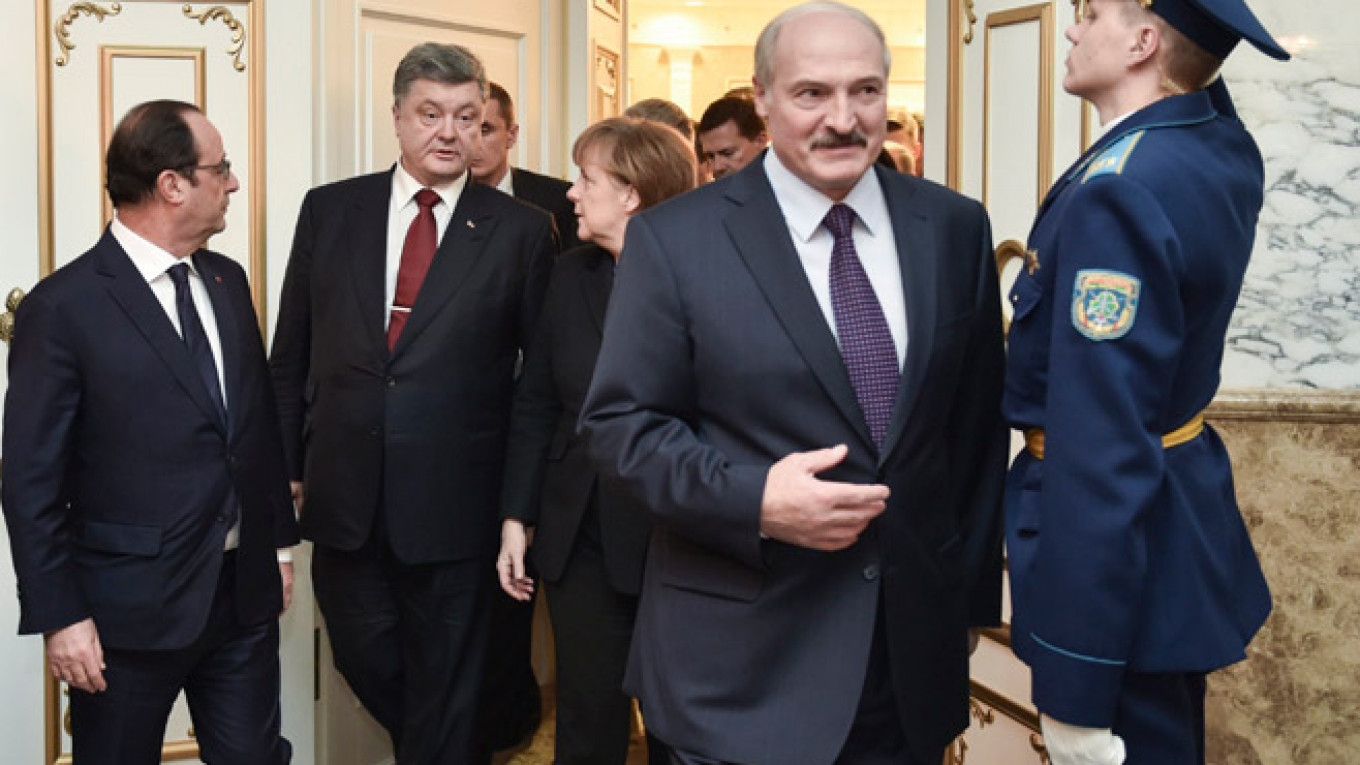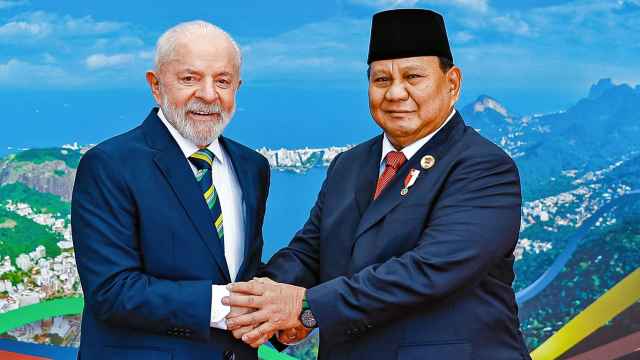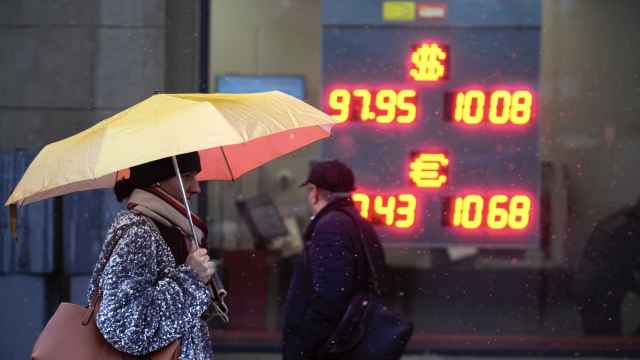The ink was barely dry on the agreements reached in Minsk last week on the conflict in eastern Ukraine when speculation began as to who had "won" and who had "lost" in the agreement.
Almost all commentators have missed perhaps one of the greatest victors, Belarussian President Alexander Lukashenko, for whom the process itself, irrespective of the results, constitutes an ongoing success in trying to weave a course between Moscow and Brussels while maintaining his unquestioned political control at home.
Watching video coverage of the summit in Minsk, it seems incongruous to recall just how great an international pariah Lukashenko was less than five years ago. After a presidential election in 2010 was widely judged as violating many international standards, and protests against the unfair vote were violently suppressed by security forces, Lukashenko and others in his government were subjected to sanctions from both the European Union and the United States.
Among other measures, official contacts were reduced to a minimum in protest of violations of international standards in the parliamentary elections as well as continuing human rights abuses and repression of civil society in Belarus.
So what is one to make of the sight of Lukashenko serving as beaming host for French President Francois Hollande, German Chancellor Angela Merkel, Ukrainian President Petro Poroshenko, and, of course, Russian President Vladimir Putin? Apparently all is not forgiven, since the EU extended sanctions against Belarus for another year as recently as Oct. 30, 2014. However, an increasing stream of EU and other Western officials have been visiting Minsk recently, in an attempt to manage the growing crisis in Ukraine.
In fact, for a long time Lukashenko has sought to walk a very fine line between Russia and the West, professing loyalty to Moscow and participation in Putin's Eurasian integration project, the Eurasian Economic Union, while at the same time seeking to sustain working diplomatic and economic relationships with the West, in particular the European Union.
Belarus has steadily agreed to join economic integration projects with Russia, but has also shown itself willing to defy Moscow to defend its own interests, such as the high-profile detention of a Russian potash executive in a 2013 trade dispute. At the same time, Belarus has made minor concessions on human rights and political prisoners in return for increased dialogue with Brussels — for example, recent negotiations on visa facilitation.
In this context the crisis and subsequent war in Ukraine have posed both threats and opportunities for Lukashenko. Most obvious, an open and expanding military conflict not far from his borders poses clear dangers to stability and security in Belarus itself.
The conflict between Russia and Ukraine is also an economic threat to Minsk, which depends heavily on markets in Eastern Europe, especially the markets of both large neighbors. The political polarization between Russia and the West, especially the European Union, also narrows Lukashenko's diplomatic space for mounting new political initiatives with the West.
Finally, economic sanctions on Russia and the subsequent swift decline of the ruble have the potential for significant negative effects on Belarus's trade balance.
However, crisis and war in Ukraine and Russia's estrangement with the West have also provided economic and diplomatic openings for Lukashenko. Moscow's reverse sanctions on European goods offer great opportunities for entrepreneurs in Belarus to enrich themselves by shipping these goods into Russia disguised as Belarussian products — a ploy already employed to evade Russian embargoes on Moldovan and Georgian goods.
The crisis has also afforded Lukashenko the chance both to assert his own independence and to earn the good will of his neighbors and the EU by criticizing Russian sanctions against both Ukraine and Moldova as a punishment for them seeking to develop closer relationships with Brussels.
Most of all, the war in Ukraine has given Lukashenko the invaluable opportunity to create for himself the role of neutral, honest broker between Russia and the West, as well as between Kiev and its rebellious regions in eastern Ukraine.
Minsk was a natural venue for the talks on Ukraine, maintaining close relations with both Moscow and Kiev, yet serving as an acceptably neutral site for European negotiators. Lukashenko was careful to appear a balanced and gracious host.
In a recent news conference he alluded to his country's "sacred ties" with Russia yet also pointedly asserted that he had no intention of going to war with the West "to oblige someone." In addition to receiving Western leaders during the Ukrainian crisis negotiations, Lukashenko recently further poked the bear by announcing a visit to Tbilisi, Georgia this spring.
Nationalist leaders and analysts in Russia have denounced some of Lukashenko's assertions of policy independence as moving too far toward the West. However, the Kremlin is unlikely to see any need to rein him in, since an ostensibly autonomous Belarus is far too useful to Putin as a venue for further contacts with Western leaders and negotiations over Ukraine's future.
In addition, while Lukashenko's diplomatic charm offensive may have improved somewhat his relationship with the West, it has done little to change the nature of Belarus's domestic political regime. Violations of human rights are still systematic, prominent political prisoners remain in jail and press freedoms are still being actively restricted by government authorities.
So why should Lukashenko play the neutral mediator and peacemaker? On the positive side, aside from considerations of Lukashenko's personal vanity and ambitions to restore his international reputation, relations with the European Union and even the United States have improved, and Belarus has more balanced foreign economic ties.
On the cynical side, Belarus has elections coming later this year, and no improvements in press, civil society or electoral freedoms seem to be on the horizon. Lukashenko is surely not afraid of losing, but the extent of international condemnation of yet another rigged vote may be a concern.
Perhaps Minsk authorities hope that diplomatic successes and improving relations with Brussels might obscure the absence of change in the country's repressive domestic political environment. At some point authorities in Belarus may act more responsively to the desires of the country's civil society. For now, smart money is with the cynics.
William H. Hill is a public policy scholar at the Kennan Institute in Washington's Woodrow Wilson International Center for Scholars.
A Message from The Moscow Times:
Dear readers,
We are facing unprecedented challenges. Russia's Prosecutor General's Office has designated The Moscow Times as an "undesirable" organization, criminalizing our work and putting our staff at risk of prosecution. This follows our earlier unjust labeling as a "foreign agent."
These actions are direct attempts to silence independent journalism in Russia. The authorities claim our work "discredits the decisions of the Russian leadership." We see things differently: we strive to provide accurate, unbiased reporting on Russia.
We, the journalists of The Moscow Times, refuse to be silenced. But to continue our work, we need your help.
Your support, no matter how small, makes a world of difference. If you can, please support us monthly starting from just $2. It's quick to set up, and every contribution makes a significant impact.
By supporting The Moscow Times, you're defending open, independent journalism in the face of repression. Thank you for standing with us.
Remind me later.






